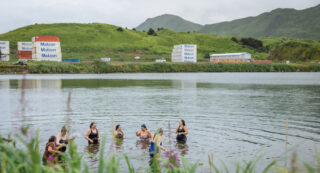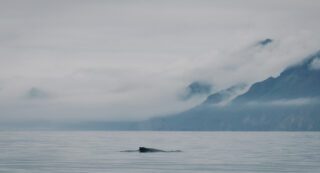Photography By Schuyler Alig
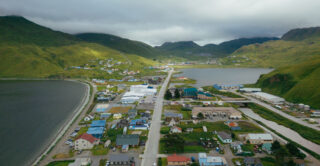
The Aleutian Islands are located hundreds of miles from the Alaska mainland in the Bering Sea, accessible only by plane or boat, and often facing harsh, unpredictable weather. In August, Aleut/Unangax̂ Tribes, Alaska Maritime National Wildlife Refuge, and other federal and regional partners came together to discuss opportunities for co-stewardship of Aleutian lands and waters. Although Alaska Maritime National Wildlife Refuge is the largest land owner in the region, the Unangax̂ people have called the area home and have been stewards of the land for millenia. By gathering locally, participants’ words were grounded in reality, surrounded by the very environment they wish to protect. Alaska Conservation Foundation (ACF) staff and planning committee hosted the Aleutian Pribilof Guardians Workshop this August. Representing seven of the 13 Aleut Tribes including, Akutan Tribe, Aleut Community of St. Paul Island, Native Village of Atka, Belkofski Tribe, False Pass Tribe, Qagan Tayagungin Tribe of Sand Point, and the Qawalangin Tribe of Unalaska. Gathering in Unalaska, at the heart of the Aleutian Islands, was both a great gift and logistical hurdle in bringing this event to fruition. With the goal of creating a blueprint for future Indigenous-led conservation efforts in the region, it was essential to center the voices of the people most connected and affected by these biodiverse ecosystems.
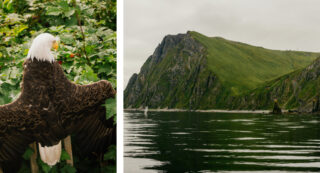
The Aleutian Bering Sea Initiative (ABSI), a regional program hosted by the Alaska Conservation Foundation (ACF) that is dedicated to Indigenous-led conservation in the Aleutians and Pribilofs organized the workshop. ABSI is part of ACF’s Northern Latitudes Partnerships, which supports Indigenous-led conservation across approximately 70% of Alaska through three regional partnerships. ABSI’s 13-year, close relationship with the Alaska Maritime National Wildlife Refuge helped bring their leadership into a productive discussion on managing lands with Tribes. The workshop was made possible with funding from the Gordon and Betty Moore Foundation. The gathering focused on bridging Indigenous Knowledge, science and resources to safeguard Aleutian ecosystems, address climate change, and ensure cultural continuity. Conversations focused on relationship-centered co-stewardship, capacity building,resilience planning, and the fishing industry; all with a goal of developing a regional guardianship framework that emphasizes Indigenous leadership in decision-making. In order to get there, ABSI Coordinator Nadine Kochuten emphasized the value of “Working at the Speed of Trust”. If distrust creates friction, then relationship building needs to be prioritized to create a more effective “well-oiled machine”. Gathering in person is essential to this trust building process as ABSI Cultural Advisor and Unalaska local, Piama Oleyer, advised the planning committee to focus on people and relationships over larger agency-wide priorities.
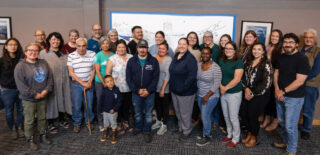
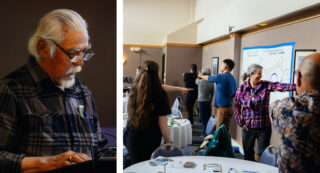
Daily workshop sessions highlighted shared priorities in the region. A few questions in particular surfaced throughout the gathering. Who has jurisdiction over what when addressing land and water governance? How can we track and share baseline data to know the ecological health of Aleutian waters? How are the findings from research and science integrated within communities, and are studies designed with local input?
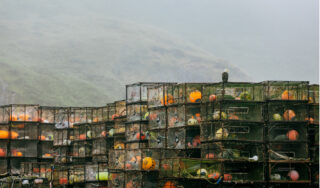
Many community members voiced the realities of living in Unalaska where the fishing industry has affected the balance of their local marine ecosystems and some of their subsistence resources. Discussions around food security, equitable knowledge exchange, communication and governance gaps, invasive species, harmful algal blooms, kelp forest degradation, and marine species population decline were some of the common threads when talking about water and land guardianship. The Alaska Maritime National Wildlife Refuge, an original founder of ABSI, underscored underscored conservation challenges and the need for deeper co-management with Tribes while also sharing examples of recent partnerships with local communities, such as theLost Village Project, participating in local culture camps and working with communities on invasive species eradication.The Qawalangin Tribe of Unalaska, also one of the original founders of ABSI, presented their Usugilix Awakun (We are working together) approach blending science and culture across fisheries, remediation, and community health. The Aleut Community of St. Paul Island Tribal Government showcased their Indigenous Sentinels Network, a Tribally-led monitoring program that has been supported by ACF for several years to strengthen Indigenous Data Sovereignty by utilizing a suite of applications to record various scientific observations. Small group breakouts reinforced alignment on strengthening communication, building workforce strategies, and addressing ecological change with both traditional knowledge and science.
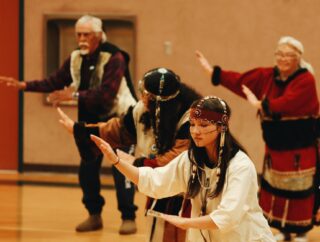
Cultural contributions kept participants engaged while sharing traditions and values. In the evenings, workshop participants were also able to attend the first Anĝaĝinangin Festival. Unangax̂ dance groups came together from across the region to perform songs and dances, inspired by the Aleutian landscape—grounded in the gathering of reciprocity, resilience, and intergenerational responsibility. At the Aleutian Pribilof Guardians Workshop, participants reached consensus on immediate priorities: improve communication and coordination among partners, secure sustainable long-term funding, and formalize a collaborative regional network to support and advance co-stewardship. Overall, the workshop reaffirmed the regional partners’ shared commitment to Indigenous-led stewardship to protect the Aleutian and Pribilof Islands for future generations. Despite attendees being grounded for an extra few days due to weather, lasting relationships had already taken flight.
